How To Start Ginger Farm In Nigeria- When you talk about one of the widely used spices in Nigeria, you cannot skip ginger, because of its aroma, and strong and hot taste.
Ginger is commonly used across Nigeria be it fresh dried or processed as a food spice, and as an oil or juice, in fact, many persons even consume it fresh.
Because of the high demand for this farm produce, that is why both new and existing farmers have picked interest to grow ginger in Nigeria.
So, we will assist you in planting garlic and getting high-yielding varieties at harvest.
To learn how to grow ginger in Nigeria, you have to choose a location, land prepare, buy your ginger rhizomes, plant, fertilizer application, ginger management, and harvesting.
How to Grow Ginger in Nigeria
To start growing ginger, we have carefully outlined and discussed the steps involved below to guide you throughout from planting to harvest period.
Step 1: Choose a Location
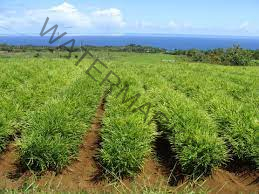
Ginger farming requires farmland where it will be planted especially if you are considering commercial large-scale farming. Concerning growing ginger, there are vital considerations you need to pay attention to before choosing a location.
Soil Properties
You need to consider choosing a location that has the right soil property. For ginger to grow appropriately, it requires loose well-drained soil. As such you might consider an area with loamy soil.
Read Also: [Beginners Tips] How to Grow Garlic in Nigeria
Climate Condition
Another consideration is the weather. Garlic thrives in an area with mild weather as it does not grow well in direct sunlight.
Water Accessibility
Ginger farming cannot be successful without watering. So, you need to consider a location with easy access to water for manual plant watering or irrigation.
Step 2: Land Preparation
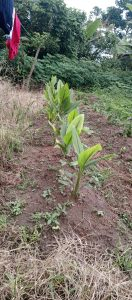
Now that you have acquired a precise location that suits ginger farming, you have to prepare the land to make it suitable for growing the garlic rhizomes. Farmland preparation is one of the most important steps in the growing phase.
As such, the land preparation comprises clearing unwanted plants and trees on the farmland, afterwards, the land should be plowed or tilled to make it appropriate for planting.
Read Also: How To Start Growing Cashew In Nigeria [Beginners Guide]
Leveling of the farmland should be done to even out slopes and holes, then manure should be applied to the soil to enrich its nutrient component. Wet manure should be avoided as dry manure is best applicable.
Raised farm beds or heaps should be made where the ginger rhizomes will be planted.
Step 3: Buy your Ginger Rhizomes
Ginger is commonly planted adopting the propagation. It is best to plant your ginger rhizomes in a nursery to bud before transferring the budded plant to the main farmland where it will germinate and mature.
To plant either directly on the farmland, or nursery for transplanting, you have to examine the ginger rhizomes to be sure it has yellow-brownish skin and is free from pests and diseases.
However, ginger rhizomes that are yet to grow the external thick yellow-brownish skin should be placed under direct sunlight for 3-7 days to grow the old skin.
Note that the ginger rhizomes are cut into parts at least 2-3 weeks before planting.
Read Also: How To Start Cocoa Farming In Nigeria
Step 4: Ginger Rhizome Planting
Ginger can be planted on the prepared farm bed or in the garden by digging a hole that is three times its size, subsequently, the ginger rhizomes (or sett) should be planted in the hole.
During planting, ensure that the bud of each sett is pointing upwards in the soil. Make sure you space each sett at about 30cm from another sett. It is the sett planted in the hole that grows into a new ginger plant.
Note that you have to water the plant immediately after planting. Also, the best period to plant ginger in Nigeria is late in the dry season, or early wet season.
Step 5: Fertilizer Application
You can apply fertilizer or pasteurized manure to enrich soil fertility and nutrients. Supplemental application to the soil should be done at an interval according to the growth rate and size of the plant.
Step 6: Ginger Management
You should observe and monitor your ginger plants as they grow so that you can manage them and help them grow appropriately.
Read Also: How To Start Carrot Farming In Nigeria [Beginners Guide Pdf]
Pest and Disease Control
Several pests are attracted to ginger plants which can cause plant disease. You need to carry out regular farm surveillance to watch out for pests such as Snails, mites, borers, and nematodes among others that may affect your ginger plants.
Make use of insecticides or pesticides to kill or drive away pests. Also, remove weeds that grow alongside the plants to end competition for water and other nutrients.
Routine Watering
Ensure you water the ginger plants daily so that the soil will retain moisture to help in continuous growth. However, avoid over watering so to avoid root rot that may lead to other diseases and the plant eventually dies.
Step 7: Harvesting
Matured ginger is often harvested about 8-10 months after planting. You will know that your ginger is ready for harvest when it has yellow leaves and dry pseudo stems. You have to dig around the plant gently and lift the ginger rhizomes with a digging fork or a spade and clean off soil particles.
Read Also: How To Start Cucumber Farming In Nigeria [ Beginners Guide Pdf]
How Long Does Ginger Take To Grow In Nigeria?
From the time of planting to germination and full maturity stages, it takes about 8-10 months for ginger to grow in Nigeria.
How Profitable Is Ginger Farming In Nigeria?
Ginger farming is a profitable business in Nigeria that will guarantee you a high-profit margin. As of the time of this writing, some farmers sold an average of 500,000 nairas per ton of garlic.
What Month Is Best To Plant Ginger In Nigeria?
To plant garlic in Nigeria, the months of March to April during the rainy season are considered to be the best planting period.
Which State Is The Largest Producer Of Ginger In Nigeria?
In Nigeria, the state considered to be the largest producer of ginger is Kaduna state, principally the southern region of the state.
Does Ginger Need A Lot Of Water?
Ginger requires water throughout its growth process and it requires water throughout the period. Watering the garlic plant will help it actively grow as the soil should never dry out, or overflood.
How Long Does It Take To Grow Ginger?
It takes ginger about 8 to 10 months to grow from planting to mature plants that can be harvested.
How Do I Start A Ginger Business?
To start a ginger farming business, you need farmland to farm, cultivate the land, purchase ginger rhizomes, plant the sett, manage the plants, harvest, sort, clean and process to be sold in the market.
Is Ginger A Cash Crop?
Ginger is a herbaceous perennial crop that is grown as an annual because of its rhizomes. However, the plant is a valuable cash crop.
How Do You Prepare Ginger For Land?
Preparation of ginger for soil requires you to cut the ginger rhizome into 1- to 2-inch pieces, afterwards you place them in the sun for about 3-7 days so that the cut surface area can grow old skin that is yellowish. Part of the rhizomes is planted in the planting hole made on the seedbed and covered with soil
How Do You Make Ginger Bigger?
To get optimal yield produce as well as bigger ginger than usual, it is imperative that before you soak the ginger rhizomes in water overnight to rinse off the growth retardant that is sometimes used to preserve ginger.
Also, during planting, the rhizomes should be planted 6-8 inches apart, and 2-4 inches deep, and most importantly, the growth buds pointing upward.
What Is The Lifespan Of Ginger?
The life span of ginger ranges from weeks to months, at large three months before it starts getting mouldy. The best way to preserve garlic is to keep it unpeeled and refrigerated.
How Much Can I Sell Ginger For?
You can sell a bag of your fresh ginger per bag between ₦12000 to ₦17000. However, the price varies depending on the time and season.
Does Nigeria Export Ginger?
Nigeria is the leading producer of ginger in Africa and it is one of the major exported farms produced to several countries around the world including India, the USA, Indonesia, UAE, and many more.
What Is The Yield Of Ginger Per Hectare?
The average yield of ginger per hectare of farmland in Nigeria ranges between 13–27 metric tons which is less than the global average of about 35–40 metric tons when compared.
Which States Produce Ginger In Nigeria?
The top ginger-producing states in Nigeria are Kaduna state, Bauchi state, Benue State, Gombe State, and Nasarawa state.
Where Is Ginger Grown Commercially?
Ginger is grown commercially in several countries around the world. The leading countries in terms of the global production are China, India, Indonesia, Nepal, and Nigeria.
What Is The Best Fertilizer For Ginger?
Low-nitrogen fertilizers are the best supplemental application for ginger, especially the 10-20-20.
What Are The Best Conditions For Ginger Root To Grow?
The best weather condition for ginger to thrive best in warm, humid climates. So, make sure you choose a site that provides plenty of direct sunlight.
When Should I Plant Ginger?
If you want to plant ginger rhizomes, you should do so 2-3 weeks before the rainy season starts.
How Do You Know Ginger Is Bad?
Typically, rotten ginger smells and is accompanied by a sharp unpleasant smell. You also feel through touch that the texture has changed.
Can You Grow Ginger In Water?
Yes, ginger can be grown in water known as hydroponic farming and it has advantages over traditional cultivation.
How Do You Harvest Ginger Without Killing Plants?
To harvest ginger without killing the plants, you have to cut off a small section or the exact size of the root you need with a sharp knife, then replace the soil and ensure it is well watered.
Can Ginger Grow In southwest Nigeria?
Although ginger is predominantly grown in the northern region of Nigeria, the plant can also be grown in southwest Nigeria, especially in Oyo and Lagos states.
Why Is Ginger Rate So Low?
Ginger’s low rate is a result of diseases affecting the crop, especially bacterial wilt disease affecting matured rhizomes, which is the major reason.
How Often Do You, Water Ginger?
Routine daily watering is important for your ginger plant to grow appropriately. Early morning and late evening watering is best but ensures the soil is not flooded.
How Do You Take Care Of A Ginger Plant?
Ginger plants should be planted in warm, humid locations where they will have access to a lot of sunlight. Also, the plants should be watered daily to avoid dehydration. Also, ginger plants don’t tolerate strong winds or poorly draining soil as well.
Is Chicken Manure Good For Ginger?
Chicken Manure is excellent manure for ginger farming as long as it is of good quality.
Is Cow Manure Good For Ginger?
Cow dung manure is good for ginger farming, especially when used as part of the element for making compost.
Does Ginger Need A Lot Of Fertilizer?
Yes, ginger plants require fertilizer to grow appropriately. It is better to fertilize a lot than to under fertilize which can cause weak growth.
What Is The Yield Of Ginger Per Plant?
The expected yield of ginger per plant would be 10 to 25 t/ha of fresh ginger.
Cost of Farming one Hectare of Ginger in Nigeria
As of the time of this writing, the cost of farming one hectare of ginger in Nigeria is estimated to be 850,000 Naira.
Types of Ginger in Nigeria
The type of ginger predominantly grown in Nigeria are yellow ginger and black ginger.
Conclusion
I hope you find this guide to be helpful as you venture into ginger farming in Nigeria. Ensure you adhere to the steps discussed in this material for optimal results.
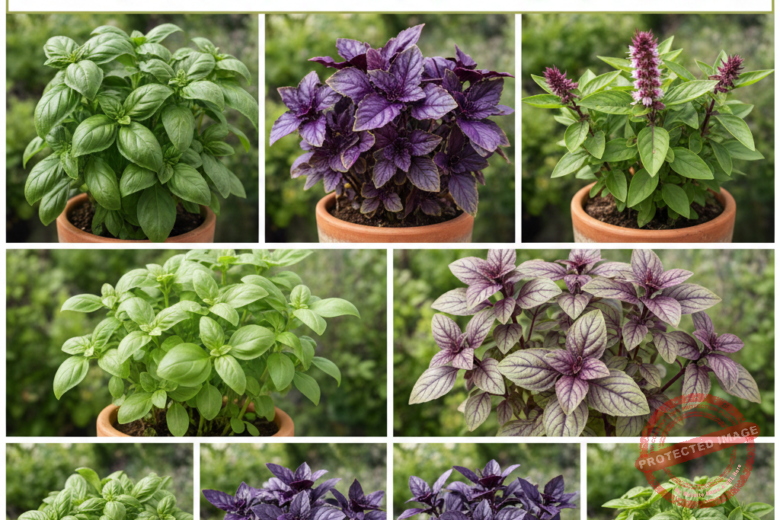
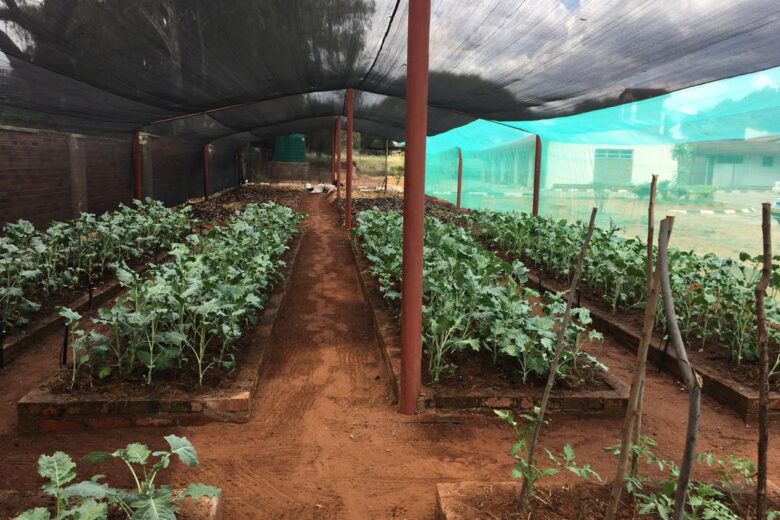

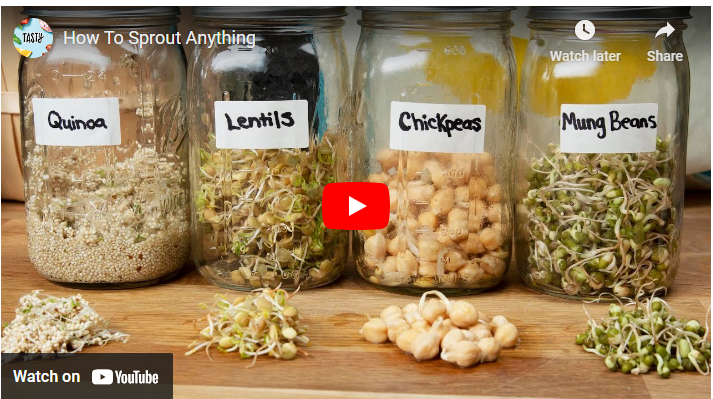
Very educative!